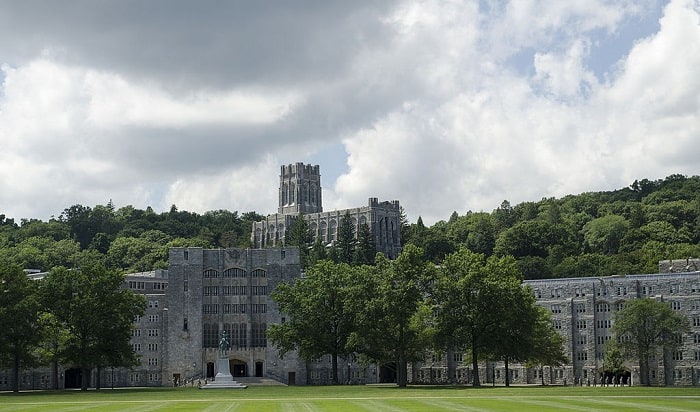Military schools are a good alternative to conventional education. The biggest difference with military schools is that there is an integration of military principles in the curricula. Despite this, military schools, like other traditional schools, strive to prepare students for lifelong success.
If you are considering military school, you will want to know the answer to “What is military school like?”. Indeed, it is not as easy to research and get to know military school life as other ordinary schools. There are not a lot of military school reviews available online as well. Understanding this, we have put together a detailed article covering insights into what happens in military school.
Continue reading to find information on the questions: what is military school really like, what do you do in military school, and what happens in military school?
Table of Contents
A Closer Look Into Military Schools
1. Types
To start, it is important that you know there are different types of military schools. Most people use the umbrella term “military schools”, but there are, more specifically, military high schools, federal service academies, state-supported maritime colleges, senior military colleges, junior military colleges, private college-prep military schools, public military schools, and graduate schools.
They are similar in the sense that they operate within the military’s discipline framework. However, they have variable expenses, from free to fairly high tuition.
- Senior military colleges: Four year colleges and universities leading to a baccalaureate and commission in the Armed Services.
- Junior military colleges: Two-year colleges and universities offering an Associates degree and opportunities for early commissioning in the Armed Forces
- College-prep military schools: Charter schools, day schools, or boarding schools that prepare students for college success.
Some schools can also be boys-only or girls-only, though most are coeducational.
2. Enrollment
There are a lot of myths around the enrollment of military schools. The most common claim that military schools are where the problematic “delinquents” go. Hence, it is a place for punishment. In fact, Google will give 85,000,000 results if you search up “Is military school a punishment?” But, in reality, this is far from the case.
Military schools are very selective. You must be highly motivated and disciplined to pass the admissions process. So, if you do get admitted, it will be an honor. You will be one of the most respected students in the country. Hence, in this regard, attending military school is a privilege, not a punishment.
However, note that motivation and discipline alone will not get you a slot. You will have to demonstrate physical and academic excellence as well.
- The former requires applicants to sit an extensive medical assessment covering both physical and mental health. Particular academies will also want results from the Candidate Fitness Assessment (CFA) – a six-event exam testing endurance and strength.
- The latter entails that standard college application requirements are applicable. You will be assessed based on your personal statement, transcript, test scores (Ie. SATs), and letters of recommendation.
Note: Still, each school will have its own specific requirements. Usually, you can find this information on the school’s official website.
For post-high school military academies, you will have to start filling out questionnaires in junior year, and unless you are applying for the U.S Coast Guard, you will have to first apply for nominations from members of the Congress, the Vice President, and other military personnel. Plus, to make it even more competitive, each member of Congress can only issue a limited number of recommendations.
3. Lessons
Students are taught essential core values at military schools, including respect, discipline, accountability, solidarity, and leadership. These are all characteristics of citizens with great character. Plus, they come with soft skills, such as time management and teamwork, that aid the development of any young person. Later on, these qualities and skills can be leveraged by students, no matter their career path.
The military life, defined by routines, expectations, and positive peer pressure, help turn students into great individuals who achieve more. For example, students are expected to keep their rooms clean, maintain personal hygiene, take part in physical activities, and earn good grades. Students see other students around them meeting these expectations. So, they are positively “pressured” to do the same.
These expectations then become the standard and thus, are seamlessly integrated into daily routines. Over time, it becomes second nature for students at military schools to take good care of themselves and live an organized life. In essence, students are held to the highest standard. This helps transition young students into adulthood.
Needless to say, there is also a strong emphasis on integrity and responsibility, both of which are reinforced through a code of conduct. Violations are typically addressed with reduced personal or free time, similar to how a parent would “ground” their child.
More serious infractions, such as those involving drug or alcohol use, hazing, or bullying other students,…can even be dismissed or expelled.
Students at military schools are commonly referred to as “cadets”. They are required to participate in military training and know the fundamentals of the military as an organization.
However, serving in the military is not a must upon graduation, except those who are recipients of ROTC scholarships. These cadets will have to commit to future military service.
Even though military schools are structured, they are not the same as boot camps or reform schools. There is no place for “troubled” students with behavioral issues in military schools, such as low attendance, lack of respect, drug use, etc.
4. Daily Life
The daily schedule is different for each school, but a typical day in the life of a military school student may look like this:
- Wake up early, clean the barracks for inspection, get breakfast, and prepare for class. Some schools will have a morning physical training session.
- Classes happen throughout the day, breaking for lunch. Tutorial periods are also available for students who need extra assistance.
- More classes after lunch, then sports and physical training. These activities promote physical fitness, build confidence, and instill an appreciation for the great outdoors.
- Eat dinner, followed by a Call to Quarters (CQ), then a supervised evening study period with access to the library and computer lab.
- Report back to the barracks, relax, get ready for tomorrow, then it’s “lights out” for the night.
Here’s another example at West Point military academy.
As seen in the example of a cadet’s schedule above, there is not a lot of free time to avail of. Nonetheless, students at military schools “get as much as they put in”. If you feel like this is the environment in which you can prosper, invest in a military school education, and become future leaders of characters.
In addition, you may like this article about military school tuition or how to send your kids to military school.
Conclusion
Military school is a lot more than what mainstream myths limit it to be. To summarize, it is a place of privilege for students with academic rigor and physical competency. It is based on routines, structures, high expectations, and positive peer pressure.
The goal of military schools is not solely to military preparation, but to develop students to be leaders that have the necessary knowledge, skills, and mentality to offer what they can to the community, nation, and world.
At this point, if you feel like you are a fit for military schools, go ahead and do more research on specific schools. There is plenty of information about what is military school like available online in this regard. Let us know if you need any further help in the comments!

I am Everett Bledsoe, taking on the responsibility of content producer for The Soldiers Project. My purpose in this project is to give honest reviews on the gear utilized and tested over time. Of course, you cannot go wrong when checking out our package of information and guide, too, as they come from reliable sources and years of experience.


